| Published
on 8
Jun
2009 |
All rights reserved.
|
|
|
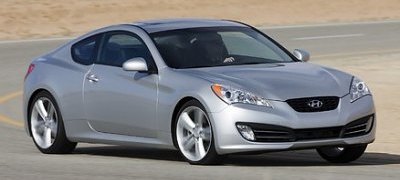
|
Genesis Coupe is built on the premium
rear-drive platform of Genesis sedan. It just doesn't show that
in price tag...
|
The
emergence of Hyundai Genesis Coupe reminds me that the world is
so short of affordable rear-wheel drive coupes these days. Wind back
20 or 25 years,
all affordable coupes on the road relied on that handling-optimizing
layout, for example, Toyota Levin and Celica, Nissan Silvia 200SX,
Mitsubishi
Starion, Opel Manta, Ford Capri, Alfa Romeo GTV... However, as the
world's mass production sedans and hatchbacks had switched
to front-wheel drive architectures,
RWD platforms were found in short supply. Car
makers calculated the costs and found they could not afford to build
dedicated RWD platforms for their coupes whose sales volumes were most
likely less than 100,000 units a year. That would either push the price
too high or result in losses. Therefore, in 1985 Toyota Celica
kickstarted a wave of transition to FF layout. Within a few years'
time, nearly all the aforementioned coupes were replaced by front-wheel
drive successors.
That is why today RWD coupes are deemed to be reserved for premium
brands like BMW, Mercedes, Jaguar, Maserati, Infiniti etc. The only
exceptions are American "pony cars". Ford managed to develop a
dedicated RWD platform for its Mustang because it was willing to
sacrifice sophistication and quality for low prices, hence driving
volume in excess of 100,000 units a year. Its historical image also
helped it to secure enough orders to make this dedidated platform
economically viable. Chevrolet Camaro adopted a similar strategy, just
further
benefited by the availability of Holden Commodore platform. The same
goes for Dodge Challenger, which was derived from Chrysler 300C.
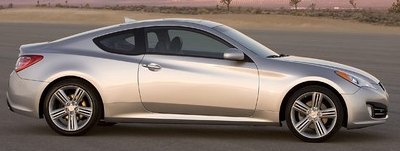
|
A sleek and sporty profile envelops a
wide body and long wheelbase to disguise its actual size.
|
The approach of Hyundai is somewhat
different - its new
Genesis Coupe is
built on the premium rear-drive platform of
Genesis luxury sedan. A question is
raised immediately: will it be too expensive to build ? Don't worry,
the Genesis
sedan has always been renowned for offering BMW 5-Series
content at 3-Series price. With some cost-down efforts, Genesis Coupe
should have no problem to offer 3-Series Coupe content at pony car
price, thanks to the superior productivity of Hyundai group. So
what exactly are the cost-down efforts? First of all, the Coupe has
abandoned the sophisticated Tau V8 and relied on a tuned version of
the 3.8-liter Lambda V6. If that's not enough,
there is a 4-cylinder turbo motor offered as entry-level choice.
Secondly, the sedan's classy multi-link front suspensions have been
replaced by cheap
MacPherson struts to save money. Thirdly, compare with the sedan, the
cabin of Genesis Coupe employs cheaper materials and basic equipments
to justify the price.
In terms of price versus features, the Genesis Coupe is unique in the
market place. US$22,000 will buy you a 2.0 turbo Genesis Coupe
completed with decent level of equipments and a proper rear-drive
chassis. A little more than $30,000 will give you a flagship Genesis
Coupe with 300 horsepower, full equipments and sport package. If you
look else where, the same money will most likely buy a front-wheel
drive Mitsubishi
Eclipse, Honda Accord Coupe or Nissan Altima Coupe, a poverty-spec BMW
128i Coupe or a nice-but-slow Mazda RX-8. None of them are considered
to be the direct competitors of this car. Instead, Hyundai sees Ford
Mustang and Chevrolet Camaro as its target, at least in America.
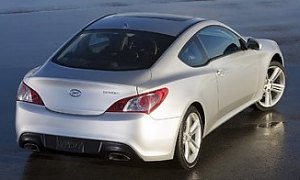
|
Overall, it is a stylish, if
unimpressive design.
|
Compare with those American icons, the
new Hyundai coupe looks far more modern. Its exterior design was
inspired by the countless of HCD concept cars preceding it. A sleek and
sporty profile envelops a wide body and long wheelbase to disguise its
actual size. The nose intake looks a little characterless, as are the
irregular-shaped headlamps, but the kickdowned rear quarter windows are
unique. Overall, it is a stylish, if unimpressive design.
From the thump of door shut, you can feel the solidity of Genesis
sedan is carried over to the coupe. That said, the cabin shows a
noticeable downgrade in quality. Soft
plastics cover only the dash top, leaving the majority surfaces of
dashboard, doors and seatbacks to cheap hard plastics. The center
console looks quite bland, not helped by the faux alloy
treatment. Cost cut is also found in the lack of telescopic steering
wheel, which means tall drivers will find the driving position
compromised. The lack of electric adjustment for the front
passenger seat is similarly odd. Strangely, these essential features
are not even
offered as options, although the car is otherwise quite well equipped.
For a big coupe running a 2820 mm wheelbase, its 2+2 cabin is
definitely a let down. Slip into the rear seats, any human beings
taller than 5’ 7” will have their heads rubbed against the sloping rear
window and their knees squeezed by the front seatbacks. This
effectively
limit its usage to children. The trunk space is decent in size, but
access is made difficult by a small aperture and the
lack
of hatchback. Hyundai has a lot to learn from European and Japanese car
makers for packaging efficiency.
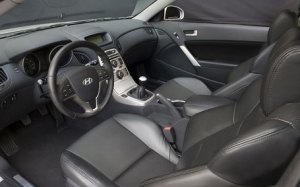
|
In terms of packaging efficiency,
Hyundai still has a lot to learn from European and Japanese car makers.
|
As before, Hyundai’s Lambda V6
features contemporary
technologies such as all-alloy construction, DOHC 24-valve heads,
dual-continuous variable
cam phasing
and a 2-stage variable intake system. In addition to a smoother intake
and exhaust system, the Coupe-specific engine has its output
boosted to a respectable 306 horsepower at 6300 rpm. In reality,
however, it doesn’t
feel as powerful as the number suggested. On the one hand, it is quite
short of torque at bottom-end and mid-range. Even the maximum
torque is just 266 lb-ft, less than the V6 of Camaro and Infiniti G37
Coupe, and that is not available until 4700 rpm. On
the other hand, its maximum rev is limited at only 6500 rpm, not as
high as a
sports car powerplant should be. Ridiculously, the V6 is dubbed "RS
3800" (see picture), where RS stands for Rear-drive Sport. Rear-drive
refers to its longitudinal mounting position, but Sport ? No kidding.
Carrying 1578 kg, the Genesis Coupe needs nearly 6 seconds to do 0-60
mph and over 14
seconds to 100 mph, probably not enough to lure American customers from
their
muscular pony cars.
The base 2.0-liter turbo comes from the “World Engine” joint-venture
with Mitsubishi and Chrysler. It produces 210 horsepower and 223 lb-ft
of torque. Performance is just as disappointing – even a Volkswagen
Golf GTI would be 2 seconds quicker to go from 0-100 mph. It also loses
the smoothness and consistent throttle response of the V6, although its
lighter weight benefits handling a bit.
Both engines mate with a 6-speed ZF manual gearbox which offers a short
throw and decent shift quality. What a pity it is mated to a heavy
clutch. Lazier drivers may opt for a 5-speed automatic for the 2.0
turbo or a ZF 6-speed paddle-shift automatic for the V6. Both software
calibrations are yet to perfect.
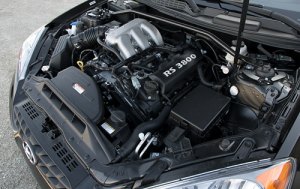 |
Its rev is limited at only 6500 rpm,
how dare Hyundai calls it “RS 3800” !
|
The Genesis Coupe can be serious to
keen drivers if “Track”
package is ticked. This includes a Torsen limited slip differential,
front suspension tower brace, Brembo performance brakes (340mm front
and 330mm
rear, with 4-pot calipers all-round), stiffer suspension setting and
19-inch alloy wheels shod with stickier Bridgestone Potenza RE050A
tires. As such equipped, it delivers decent handling and enough driving
pleasure to fight against
its key rivals.
Thanks to the wide stance and long wheelbase, the Coupe corners with
good
poise and stability, tracks straight on highway without affecting by
side wind. It’s not as sharp as BMW
coupes, but a little bit more agile than the heavier Chevrolet
Camaro and way more
precise than Ford Mustang. Its steering is a little
over-assisted and
vague on center, but it loads up nicely in corners and gives decent
feedback locks. Its handling attitude bias towards mild understeer,
just as its weight distribution of 55:45 suggested, but with stability
control disabled and a big push in throttle pedal, you can get a
progressive power slide as desired. At the limit, it is more friendly
than the
American muscle cars. The only obvious shortcoming is a harsh ride on
coarse surfaces.
Overall speaking, the Genesis Coupe is a decent coupe at a reasonable
price. However, after the impressive Genesis sedan, we can't help
feeling a little disappointed. The Coupe not only lacks the strong
character of its American rivals, but it is rarely outstanding in any
areas. Its engine, chassis dynamics, design, accommodation and build
quality are all located in the middle of the class. It fails to utilize
the sounded fundamental. It seems that Hyundai could have perfectized
it in many
areas, but eventually decided to stop there just to keep costs under
control. An unpolished diamond doesn't shine. A half-baked bread
may stop you from hungry, but it won't taste delicious. |
Verdict:    |
| Published
on 28
Mar
2012 |
All rights reserved.
|
|
Genesis Coupe update 2012
|
|
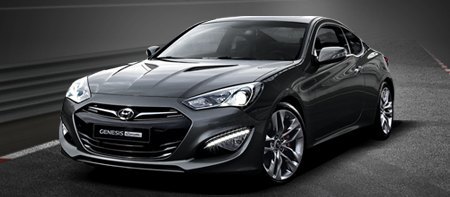
The mid-life revision made
to Genesis Coupe this year is quite extensive. It covers a facelift,
interior upgrade, modified engines, new gearbox and fine tuning to the
chassis. We'll go through one by one.
Changes made to the exterior are most obvious. It abandons the sleek
nose for an aggressive, huge hexagonal mouth to align with other new
Hyundais. This gives it a clearer identity and a stronger character
that the original design lacked. Whether it is prettier depends on your
view, and I am in no better position than you to make the judgment.
What I want to point out is that the bonnet vents are fake. In other
words, they are purely cosmetic. Similarly, a large portion of the
grille is sealed because neither the 2.0 turbo nor 3.8 V6 needs so much
area for cooling. The new Genesis Coupe is just another example to
prove that many modern cars are overstyled.
In contrast, modifications to the interior are underwhelming. There are
soft-touch plastics on surfaces that you are most likely to touch or
rest your arms on. However, the dashboard design remains uninspiring,
as its architecture is kept untouched.
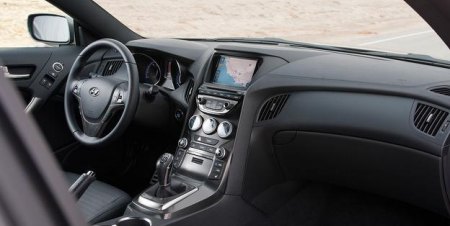
No such worry for the powertrains. Both engines have been upgraded to
deliver more power. The 3.8-liter Lambda V6 gets direct injection (GDI)
and higher compression ratio to squeeze out another 44 horsepower. With
a total of 350 ponies, it easily overwhelms the V6s of Mustang, Camaro
and Infiniti G37 Coupe, though you may point out Mustang 5.0 GT is
significantly more powerful yet cheaper to purchase. The new V6 cuts
0-60 mph by about half a second, but it still takes more time than a
BMW 135i Coupe. Although it is more sonorous than the old engine, its
power delivery feels nothing like as urgent as it sounds. The result is
still one of the least characterful six-cylinders in the class.
The 2-liter turbo four-pot engine has been added with exhaust variable
valve timing. Its turbocharger has switched to twin-scroll type and it
is now integrated with the stainless steel exhaust manifolds to cut
weight, lag and quicken heat-up. Maximum output is lifted considerably
to 275 hp and 275 lbft, along with less turbo lag. Sadly, it has yet to
get GDI, something even the Sonata 2.0T has adopted a couple of years
ago.
Hyundai claims the 6-speed manual gearbox is improved with better
gearchange and clutch take-up, but road testers found its gearchange is
still far from butter-smooth, while the clutch pedal offers little
feel. In the self-shifter side, an in-house-built 8-speed automatic
takes the space of the outgoing 5 or 6-speed auto. Unfortunately, its
manual mode brings no better response thus it is no replacement to the
6-speed manual.
Handling should be improved by a 7-percent quicker steering rack and
retuned suspensions. On the road, the Genesis Coupe shows slightly
tighter control of its body roll. Turn-in is also a bit crisper.
However, overall the chassis is still too civilized, more saloon than
sports car. Understeer is its inherent nature when it approach corners.
You have to apply throttle mid-corner to balance the understeer.
Besides, hard braking at high speed could unsettle its tail, hurting
confidence a little.
The 2012 revisions might be extensive, but they are not deep enough to
change our perception on the Genesis Coupe. This is still an
uninspiring, underdeveloped machine.
|
Verdict:    |
|